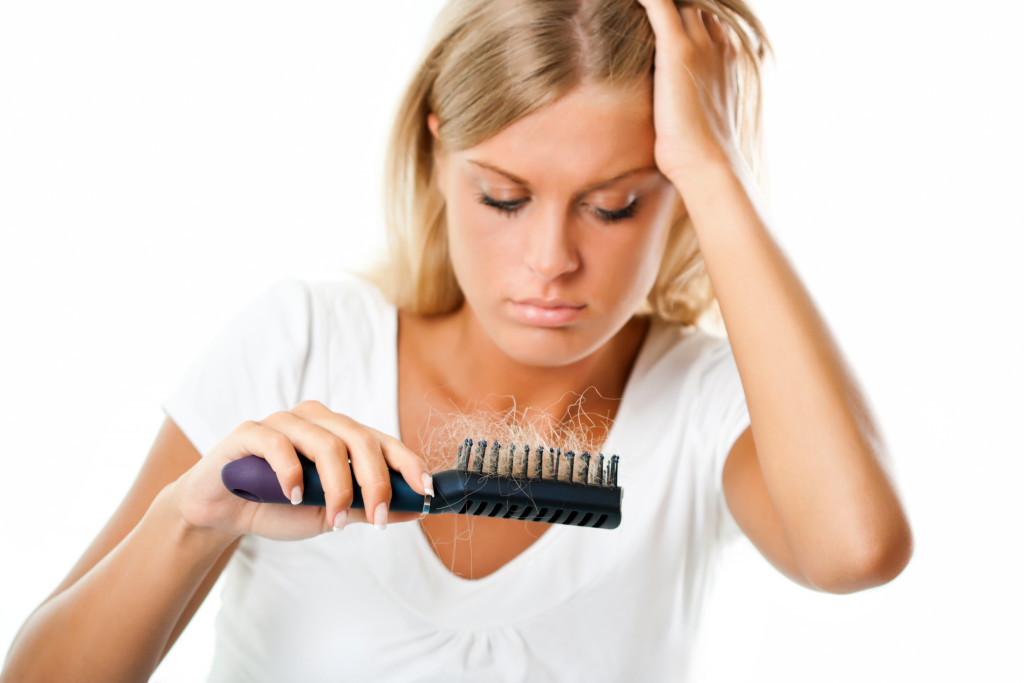Hair shedding is an inevitable part of life; yes, it clogs your shower drain, and yes, it necessitates vacuuming every other day, or your carpet will develop into a shaggy rug.
We lose roughly 80 strands every day on average. However, if you start to shed much more than that or notice that they aren’t coming back, things can begin to get a little complicated.
The problem is that there are so many potential causes of hair loss that it can be challenging to establish the specific reason why your strands are coming out and, as a result, how to treat the problem.
A variety of factors can cause hair loss in women. Medical issues, hormone changes, and stress might all be at blame. Tracing the underlying cause isn’t always simple, but this article discusses some major causes of hair fall and what you can do about it.
What Causes Female Hair Loss?
Hair loss is commonly associated with men, but it also affects women. Only around half of all women have a full head of hair throughout their lifetimes. Here are the most prevalent causes of hair loss:
-
Menopause and Hormonal Imbalance
Due to a decrease in estrogen and progesterone levels, women may have hair loss during menopause. Menstrual cycle irregularity, dry skin, weight gain, nocturnal sweats, and vaginal dryness are all indicators of these alterations. Hair loss may be exacerbated as a result of the increased stress on the body.
A hormonal imbalance can cause a slew of bothersome health and cosmetic problems, ranging from adult acne to weight gain. If your hormones are out of balance, the consequences will be felt all over your body, and of course, that includes your hair.
-
It’s in Your Genes
An inherited disease that occurs with aging is the most prevalent cause of hair loss. Androgenic alopecia, often known as male-pattern baldness or female-pattern baldness, is a disorder that affects both men and women.
In men, it manifests as a receding hairline and bald patches, whereas in women, it manifests as thinning hair around the crown of the head. When a normal hair follicle sheds, it is typically replaced by the hair of the same size. The new hair in women with female-pattern hair loss, on the other hand, is finer and thinner, like a miniature version of itself.
-
Stress Is Bad for Your Hair

Excessive stress can cause your hair to fall out, and this is not fiction. What causes this to happen? Well, stress can cause hair follicles to go into a “resting” state and stop producing new hair strands.
Moreover, stress may also cause scalp problems like dandruff, change eating patterns, and mess with the digestive system, all of which can harm your hair.
-
Vitamin and Iron Deficiency
Isn’t it true that a deficiency of vitamin B12 might make you lethargic and depleted of energy? That’s not the only bad thing; they can also harm your hair. Vitamin B12 deficiency can impact the health of red blood cells, which supply oxygen to your tissues, causing hair loss.
Iron insufficiency is one of the most prevalent reasons for hair loss in women. Iron is required for the production of hair cell protein. If in doubt, get guidance from your doctor about an iron deficiency, as they may offer a blood test to confirm the proper medication.
Solutions to Female Hair Loss
So now that you know what’s causing your hair loss, here’s what you can do to make it better:
- See a trichologist or your general practitioner if you see excessive daily hair loss for more than three months; there might be an underlying cause that has to be addressed.
- Change your diet and consume enough protein-rich meals regularly. If you have more than four hours between meals, snack on a nutritious carbohydrate such as fresh fruit, crudites, or whole wheat crackers.
- If you have bald spots, try getting a natural-looking wig to cover them up. Wigs may appear incredibly real. They’re so comfortable that you can wear them while working out at the gym or swimming. So grab one for yourself from a trusted wig shop.
- It might also assist in using the right product at the right time. There are volumizing products that you may use while your hair is still damp. Using too much product, on the other hand, might lead to weight gain.
- Massage your head when you’re washing your hair. In this way, blood flow to the scalp and hair follicles is stimulated.
If you observe or believe you’re losing more hair than you should, it’s better to figure out what’s causing it and begin treatment as soon as possible. Discuss your symptoms with a family doctor or trichologist so that they can determine the reason for your hair loss and develop a treatment plan with you.
